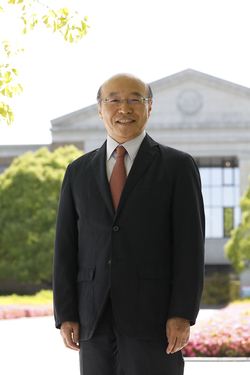Greetings from the Director
Professor Nobutaka Tsujiuchi, Department of Mechanical and Systems Engineering, Faculty of Science and Engineering

The uniqueness of the research conducted here at the Doshisha University lies in its structure to deal with current problems. While respecting the freedom of research, we strive to interpret the university’s educational philosophies of “Christian Principles”, “Liberalism”, and “Internationalism”, as well as our founding spirit of “Education of Conscience” in the context of research. Therefore, our research activities draw great interest and expectations from various social strata, including the industrial, academic, government, and private sectors.
The “Doshisha Space-DREAM Project” (Doshisha Research Project for Active Life in Space Engineering and Medical Biology) was launched in April 2018 as a Base for Advanced Education and Research in Doshisha University. It was organized to integrate various fields of the university working towards improving human health, including Science and Engineering, Life and Medical Sciences, Sports Health Science, and Neuroscience, to form an integrated research base and international hub for research cooperation on how to extend healthy life expectancies based on the study of “Space Biomedical Engineering”. This project has been incorporated in the research activities of other Bases for Advanced Education and Research, such as the Center for Interdisciplinary Study of Monotheistic Religions; Institute for Technology, Enterprise, and Competitiveness; Research Center for Energy Conversion System; and Life Risk Research Center, and approximately 40 other such research centers run by Doshisha University, as well as one of the university’s research bases for solving the most current issues.
With respect to the current state of external circumstances and social climate and the challenges presented by them, it is now more important than ever to work towards preventing and ameliorating various syndromes, such as locomotive syndrome (onset with sarcopenia, osteoporosis, or other movement disorders) and metabolic syndrome (inducing diabetes and/or high blood pressure), to extend healthy life expectancies in Japan, which has become a super-aged society.
We focus on observations revealing that the body functions that are responsible for causing these syndromes are adversely promoted in low-gravity environments like outer space. Using these observations and applying Space Biomedical Engineering, which investigates how body functions acclimatize to outer space and pursues preventive measures against that acclimation, we established a plan to extend healthy life expectancies for an average person on Earth.
Since the beginning of recorded history, universities have functioned as where scholars can conduct free research according to their own value judgments. While this is still the case, present situation has made it quite obvious that, in addition to research and education, the third mission, contribution to society, is being imposed upon universities.
In such circumstances, universities are increasingly expected to deepen their insights regarding the effects of technological developments on society and how people and society come to be. As the stages of research advance from basic to applied, or from R&D to social implementation, so does the need increase for universities to maintain a balance between competition and cooperation. Doshisha University, as a comprehensive university, will tackle problems both of humanities and science by developing the scientific and technological research results of this project into the fields of social science such as social welfare.
Because we are initiating original research using outer space environments to extend healthy life expectancies on the Earth, we named this project as “Doshisha Research Project for Active Life in Space Engineering and Medical Biology” and gave it an acronymic nickname as “Doshisha Space-DREAM Project”.
In this project, we promote remarkable research activities seeking practical applications for various medical endeavors, including new kinesitherapies for astronauts and those with trouble walking, developments in rehabilitation prescription and equipment, and drug development, in addition to contributing to the development of Space Biomedical Engineering.
|
Greetings from the Director Private University Research Branding Program |